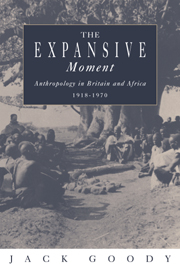Book contents
- Frontmatter
- Contents
- Introduction
- 1 The economic and organisational basis of British social anthropology in its formative period, 1930–1939: social reform in the colonies
- 2 Training for the field: the sorcerer's apprentices
- 3 Making it to the field as a Jew and a Red
- 4 Personal and intellectual friendships: Fortes and Evans-Pritchard
- 5 Personal and intellectual animosities: Evans-Pritchard, Malinowski and others
- 6 The Oxford Group
- 7 Some achievements of anthropology in Africa
- 8 Personal contributions
- 9 Concluding remarks
- Appendix 1 Changing research schemes
- Appendix 2 Towards the study of the history of social anthropology
- Notes
- List of references
- Index
8 - Personal contributions
Published online by Cambridge University Press: 30 September 2009
- Frontmatter
- Contents
- Introduction
- 1 The economic and organisational basis of British social anthropology in its formative period, 1930–1939: social reform in the colonies
- 2 Training for the field: the sorcerer's apprentices
- 3 Making it to the field as a Jew and a Red
- 4 Personal and intellectual friendships: Fortes and Evans-Pritchard
- 5 Personal and intellectual animosities: Evans-Pritchard, Malinowski and others
- 6 The Oxford Group
- 7 Some achievements of anthropology in Africa
- 8 Personal contributions
- 9 Concluding remarks
- Appendix 1 Changing research schemes
- Appendix 2 Towards the study of the history of social anthropology
- Notes
- List of references
- Index
Summary
The previous chapter attempted to spell out some of the achievements of anthropological studies based in Britain and carried out in Africa, especially as they affected neighbouring fields. I focussed in particular on West Africa where I myself had worked and I now present an even more egocentric account of my own work, beginning with field research in West Africa. I do this partly for historical reasons (since I worked closely with those on whom this study is focussed) and partly to bring out the interplay between intensive fieldwork and existing and emergent interests of a wider kind. That interplay between ‘theory’ and ‘practice’, the general and the particular, seems to me one of the marks of this tradition of social anthropology, though one that can be pursued in a variety of ways.
I had originally gone up to Cambridge on a scholarship to read for a degree in English literature and became interested, among other things, in aspects of the sociology of literature. After my first year at the university war broke out and for the next six-and-a-half years I was in the army. In the Middle East I was brought face to face not only with a wide variety of humanity, Greeks, Turks, Egyptians, Palestinians, Jews, but with the remnants of ancient civilisations. I already had some interest in archaeology because of a mathematics master at school who had collected flints in East Anglia, partly because I had lived in St Albans and had watched some of the discoveries of the Roman town at Verulamium under Mortimer Wheeler.
- Type
- Chapter
- Information
- The Expansive MomentThe rise of Social Anthropology in Britain and Africa 1918–1970, pp. 118 - 143Publisher: Cambridge University PressPrint publication year: 1995

